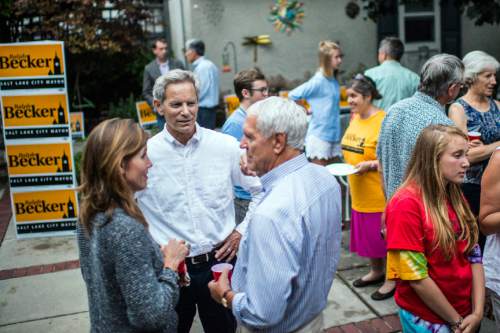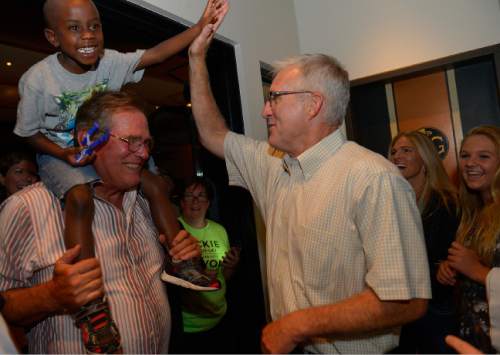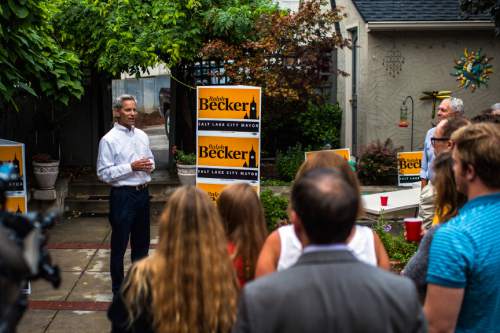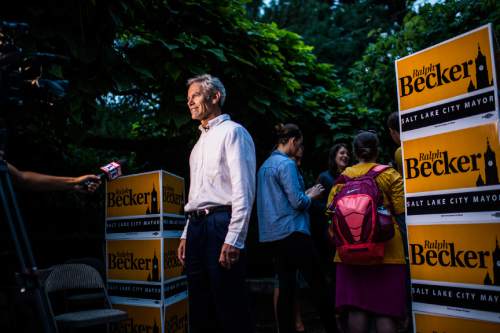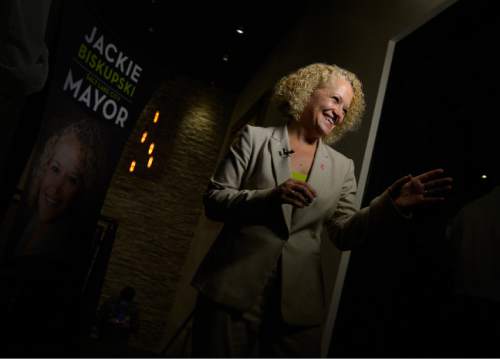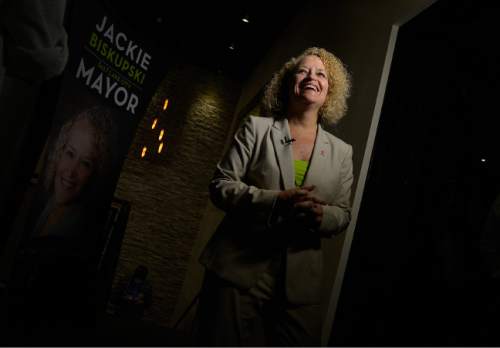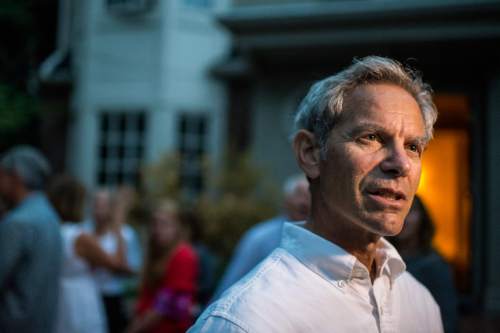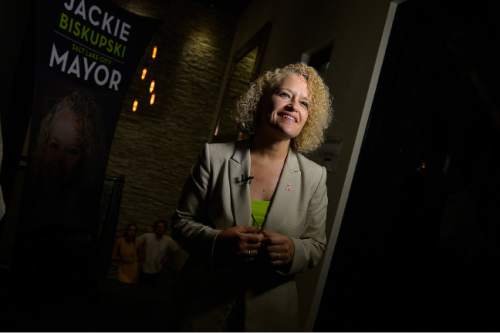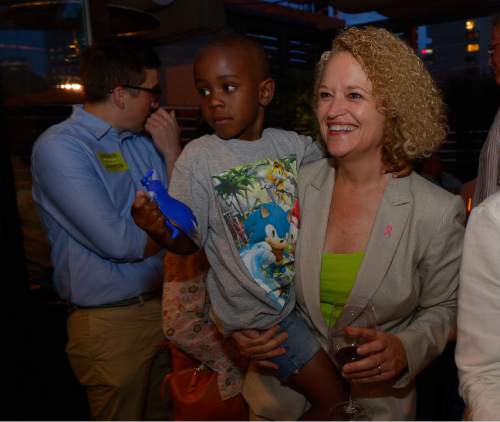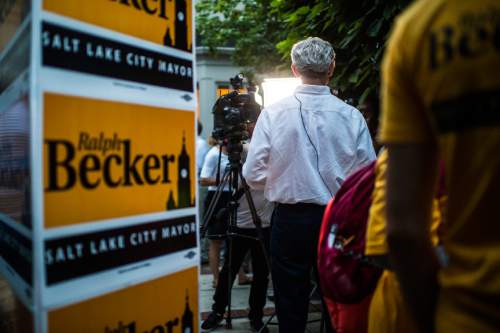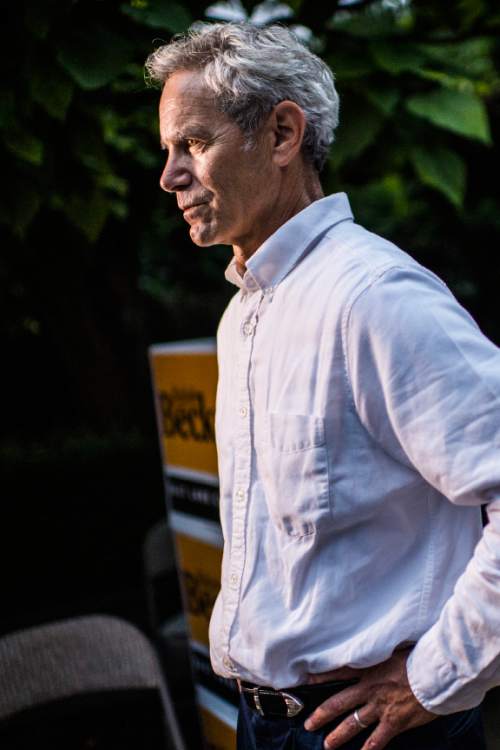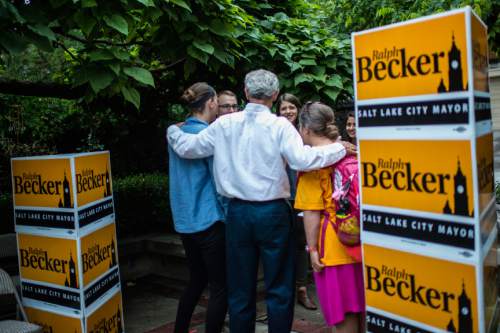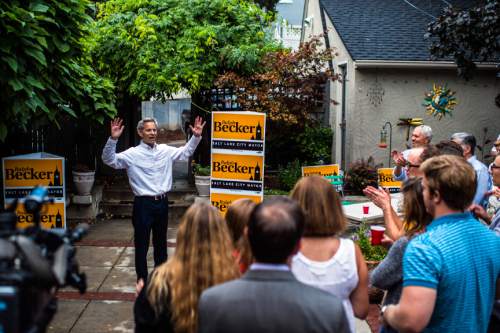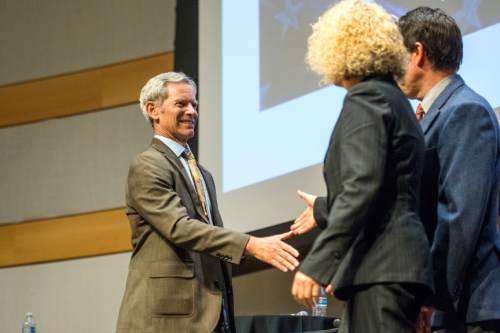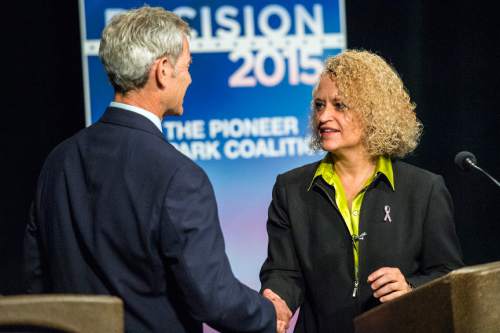This is an archived article that was published on sltrib.com in 2015, and information in the article may be outdated. It is provided only for personal research purposes and may not be reprinted.
Two-term Salt Lake City Mayor Ralph Becker made it past Tuesday's primary but faces an uphill climb going into the Nov. 3 finale after finishing well behind his chief challenger, former state legislator Jackie Biskupski.
It was a raucous primary campaign, by Salt Lake City standards, with four opponents jousting with the mayor at debates, in headlines and over the air. It caught a lot of attention from a normally subdued summertime electorate.
But when the dust settled, Biskupski and Becker easily out-polled their three rivals, City Council Chairman Luke Garrott, community activist George Chapman and businessman Dave Robinson.
With some 28,000 votes counted by 9:30 p.m. (the final tally for the night), Biskupski had captured 46 percent to Becker's 31 percent.
Garrott had 13 percent, according to the unofficial returns, with Chapman at 6 percent and Robinson at 4 percent.
About 470 provisional ballots from across Salt Lake County still need to be verified and counted. Late-arriving mail-in ballots postmarked by the deadline could change the totals as well. There are more than 71,000 registered voters in Salt Lake City.
On Tuesday evening, Chapman said he would throw his support to Biskupski.
Biskupski's campaign was all smiles as the returns came in.
"I'm excited for sure," Biskupski said. "All that hard work paid off."
She noted the fall campaign will be challenging. But now that people see she is capable of winning the mayor's race, more voters will embrace her candidacy, she said.
"The vision I've been putting out for change and new, strong leadership that is collaborative and listening to people is really resonating," Biskupski said. "As people see and listen to my message, it will inspire them to get on board with me."
For Becker, the race for mayor starts Wednesday.
"It's nice to get out of the primary," he said. "But we have been focusing our efforts all along on the general election."
Polls have indicated there are a lot of undecided voters in the city, and that could be key for the Becker campaign as it moves into the fall.
"We will assess who's voting and who's not voting and go from there," he said. "We are well positioned, not only financially, but organizationally, to move forward."
University of Utah political scientist Tim Chambless, who also is affiliated with the Hinckley Institute of Politics, said at this juncture the outlook is dire for Becker.
"The incumbent mayor is in definite trouble," Chambless said. "He has made it to the general election with 31 percent of the vote and his chief opponent is almost at 50 percent right now."
It's highly unlikely that the other 23 percent of voters who did not vote for Becker in the primary would vote for him in November, Chambless said.
Becker is seeking a third term, which is historically rare among Salt Lake City mayors. In the primary campaign, the mayor focused on his achievements, including a new Public Safety Building, a new theater for the performing arts, and, not least, a post-recession economy that is beginning to thrive.
But the mayor's campaign was rocked by the forced resignation of police Chief Chris Burbank in June, a year after a former deputy chief was allowed to retire following validated sexual-harassment complaints. Burbank was a popular chief and Becker's opponents criticized the action and its timing throughout the summer. They also scolded the mayor for building the $119 million Eccles Theater going up on Main Street without a public vote. And they took Becker to task for such things as downtown parking and alleged tone deafness to small business.
The mayor turned the tables on Biskupski in late July by alleging something could be legally amiss with billboards popping up around town supporting her candidacy. A political action committee tied to Reagan Outdoor Advertising had paid for about 15 Biskupski billboards in an effort to legally sidestep campaign-donation limits of $7,500.
But when Becker cried foul, the PAC put up some billboards for Garrott, Chapman and Robinson, as well.
The PAC did not underwrite any signs for Becker, who has been a staunch opponent of billboards dating back to his time in the Legislature.
It's been clear since the first campaign spending report July 1 that Becker and Biskupski had the most robust campaigns.
Garrott, who conceded early election night, slapped both of the victors on the way out.
"With a two-person race, I hope that voters and the media will take a more critical look at Ralph's record and Jackie's plans and issues of public transit, affordable housing, homelessness and inclusive decision-making in City Hall," Garrott continued. "Voters deserve more substance and more honesty from these two than we saw in the primary."
Robinson said he was able to accomplish much of what he set out to do.
"I, of course, got into the race very late," he said. "And we were able to get some important issues into the race, [such as the Mountain Accord]."
Chapman said he was happy that Biskupski got such a big percentage of the vote.
"I am disappointed in the number of votes [I got], but I am 100 percent determined that the people who voted for more police, better mass transit service, no new taxes or bonds and solving the homeless problem now instead of waiting for a new study will be heard."
The fall mayoral campaign looks to be a high-profile affair by two energized campaigns. And Becker goes into it with $379,151 to Biskupski's $71,016 — a difference of more than $300,000.
It is expected, however, that after winning the primary, Biskupski will be able to tap into new sources of funding.
Salt Lake County Clerk Sherrie Swensen praised by-mail voting, which led to a 39 percent turnout in Utah's capital and 32 percent countywide. She called that level of participation in a municipal primary "phenomenal and unprecedented."
Salt Lake Tribune reporter Courtney Tanner contributed to this report.


